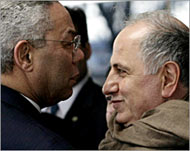US policy-makers ignored Iraqi input
US-led occupiers paid little attention to Iraqi opinion when drafting future policies for the country, a study by a US-based human rights group shows.

“The first thing the report brings out is the importance of consulting with Iraqis,” Hanny Megally, of the International Center for Transitional Justice (ICTJ) said.
The survey of Iraqi attitudes towards transitional justice, released on Wednesday, indicates these have often been out of step with policies pursued by US administrator in Iraq Paul Bremer.
The survey examined the attitudes of 395 people, drawn from a broad spectrum of the Iraqi population, through interviews and focus groups in July and August last year.
“The big problem we have seen in the last year has been the United States going it alone, consulting with a limited number of Iraqis, mostly their friends and advisers, many of whom came from outside,” Megally said, referring to former Iraqi exiles.
Loss of credibility?
He said the planned formal handover of sovereignty to an interim Iraqi government on 30 June offered the chance to change course without loss of credibility for Washington and London.
“We are seeing the June deadline as a good opportunity to learn the lessons of the past and focus on putting together mechanisms and processes of consulting Iraqis,” Megally explained.
The United States had hitherto made assumptions about what Iraqis wanted, he said, citing the sweeping measures Bremer took upon his arrival in Baghdad a year ago. The first misstep was to uproot Saddam’s Baath party and bar many of its members from public sector jobs.
However, the ICTJ survey finds that Iraqis make a clear distinction between “Saddamists” “with blood on their hands” and people who joined the Baath party for practical reasons.
Old friends
Nearly a year after dissolving the Baath party and Iraq’s armed forces, Bremer said last month his “de-Baathification” policy had been unfairly implemented and promised adjustments.
 |
|
US depended on limited number |
The ICTJ report, titled Iraqi Voices, suggests other reasons for Iraqi hostility to the US-led occupation.
“Comments indicated distrust of the United States because of the historical support provided to Saddam Hussein and the disorder, lack of security and looting that followed the end of his regime,” it says.
The study, produced with the Human Rights Center at the University of California, Berkeley, also reveals Iraqi anger at the United Nations for the years of sanctions.
Megally said the Iraq Special Tribunal, set up in December to try Saddam and top Baathists, appeared to be Iraqi-led in name only, with the United States calling the shots.
He said the US approach to mass graves had been to treat them as a source of evidence for prosecuting Saddam, which, however worthwhile, did little to meet the needs of relatives desperate to learn the fate of their missing loved ones.
|
“The big problem we have seen in the last year has been the United States going it alone” Hanny Megally, of the ICTJ |
Megally said Iraqis were keen to see how the United States dealt with American soldiers involved in abusing Iraqi detainees in Baghdad’s Abu Ghraib prison or elsewhere.
“If people have been tortured there should be a transparent process, investigations, accountability. This is how you establish the rule of law,” he said, adding that some Iraqis would remain suspicious unless there was an independent inquiry.
The full report can be found at www.ictj.org.